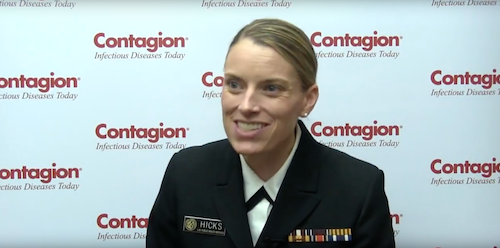
Antibiotics
Latest News
Latest Videos

CME Content
More News

Nicola Thompson, PhD, explains how her research can lead to initiatives that aim to result in a decline in the burden of infections in nursing homes.

Gonzalo Bearman, MD, MPH, professor of medicine, and hospital epidemiologist, Department of Internal Medicine and Infectious Diseases, Virginia Commonwealth University, explains how controlling antibiotic use can impact Clostridium difficile rates.
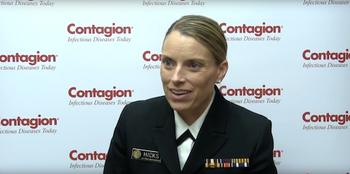
Lauri A. Hicks, DO, Director, Office of Antibiotic Stewardship, Centers for Disease Control and Prevention, discusses the importance of preserving the effectiveness of antibiotics.

Researchers at Houston Methodist Hospital have identified that a surprising percentage of Klebsiella pneumoniae infections at their facility are caused by uncommon strains of the pathogen.

In case you missed them, here are our top 5 articles for the week of May 7, 2017.

Belinda Ostrowsky, MD, MPH, Health Systems Director of Epidemiology, Antimicrobial Stewardship & Infection Prevention, Montefiore Medical Center, and Associate Professor of Clinical Medicine, Division of Infectious Diseases, Department of Medicine, Albert Einstein College of Medicine, explains how empiric treatment can lead to antibiotic overuse.

Lauri A. Hicks, DO, Director, Office of Antibiotic Stewardship, Centers for Disease Control and Prevention, discusses new resources dentists can use for prescribing antibiotics prophylactically.

What can healthcare providers do to stop these infections before they start?
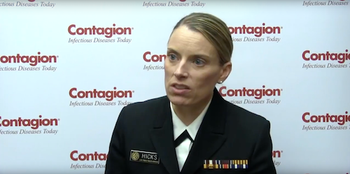
Lauri A. Hicks, DO, Director, Office of Antibiotic Stewardship, Centers for Disease Control and Prevention, discusses what we still don’t know about antibiotics.

Contagion® Editorial Advisory Board member, Khalid Eljaaly, PharmD, BCPS, CAPP, discusses key updates in the Infectious Diseases Society of America and the American Thoracic Society recommendations.

There has been an increase in STDs seen in US emergency departments, a setting that proves to be less than optimal for providing STD care.

Today, May 5th, is Hand Hygiene Day, a day that reminds healthcare workers, visitors, and policy makers alike, that frequent handwashing can be used to fight the growing threat of antibiotic resistance, and ultimately, save millions of lives.

Lauri A. Hicks, DO, Director, Office of Antibiotic Stewardship, Centers for Disease Control and Prevention, explains the importance of identifying gaps in antibiotic stewardship.

Lauri A. Hicks, Director, Office of Antibiotic Stewardship, Centers for Disease Control and Prevention, discusses how more data is needed to provide dentists with better guidelines for prescribing antibiotics.
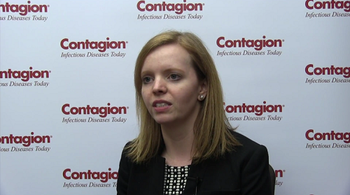
Emily Heil, PharmD, BCPS-AQ ID, assistant professor at the University of Maryland School of Pharmacy, explains why stewards should think outside of the box when coming up with interventions to include in an antimicrobial stewardship program.

Lauri A. Hicks, DO, Director, Office of Antibiotic Stewardship, Centers for Disease Control and Prevention, discusses the potential consequences of prescribing unneeded antibiotics.
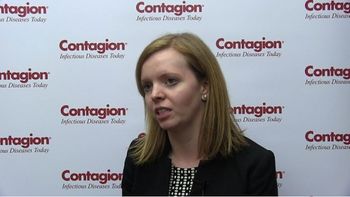
Emily Heil, PharmD, BCPS-AQ ID, assistant professor at the University of Maryland School of Pharmacy, shares an effective stewardship intervention for ruling out if someone is allergic to penicillin.

An outbreak of MRSA at a Los Angeles-area hospital’s neonatal intensive care unit has raised questions about when health officials were notified of the outbreak, and why the public was not informed sooner.

A new treatment for antibiotic-resistant bacteria may reduce effects of chronic infections, lessen the days spent in hospitals, and reduce the use of antibiotics.

Lauri A. Hicks, DO, Director, Office of Antibiotic Stewardship, Centers for Disease Control and Prevention, discusses what we know about antibiotic prescribing habits among dentists.

A £150 million program funded by NHS England aimed to study how rapid point-of-care infection-testing for hospital patients could impact the number of antibiotics prescribed.

Madeline King, PharmD, assistant professor of Clinical Pharmacy at the University of the Sciences, Philadelphia College of Pharmacy in Philadelphia, Pennsylvania, discusses the significance of the findings of her research on Ceftazidime-Avibactam.

Researchers from McGill University, Montreal, have found that maple syrup extracts can enhance the effectiveness of certain antibiotics used against pathogenic bacteria.

Emily Heil, PharmD, BCPS-AQ ID, assistant professor at the University of Maryland School of Pharmacy, and Contagion® Editorial Advisory Board Member, discusses how antibiotic allergies can affect stewardship.

A new study has found that young and middle-aged adults who were prescribed long-term antibiotics later had increased risk of colorectal adenoma, a suspected precursor to cancer.



